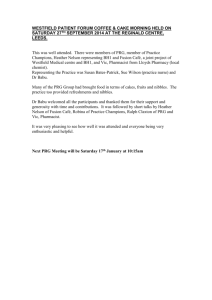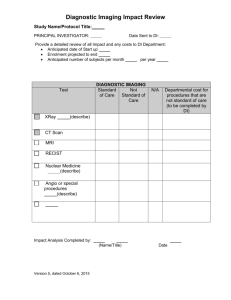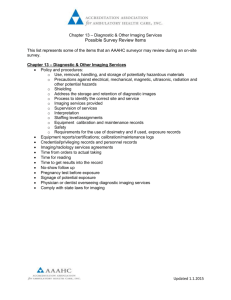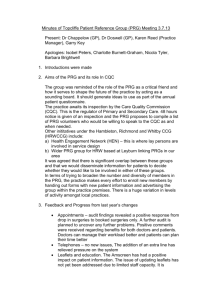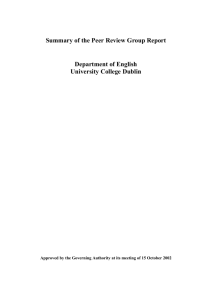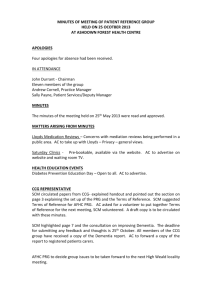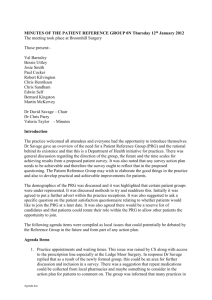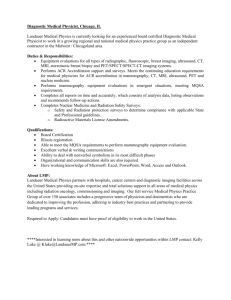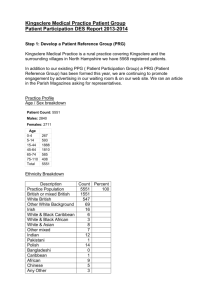Summary of the Peer Review Group Report
advertisement
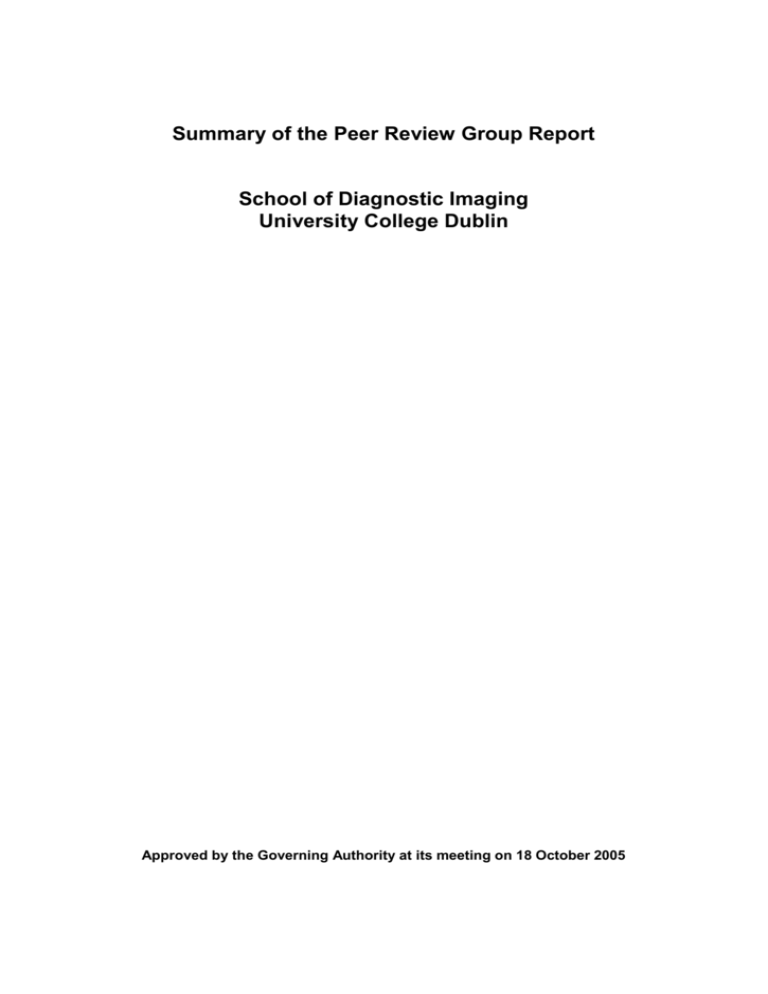
Summary of the Peer Review Group Report School of Diagnostic Imaging University College Dublin Approved by the Governing Authority at its meeting on 18 October 2005 School of Diagnostic Imaging Members of the Peer Review Group Name Affiliation Role Dr Vera Čapková Former Head, Department of Linguistics, University College Dublin Chair Dr Geraldine O’Neill Head, Centre for Teaching and Learning, University College Dublin Rapporteur Head, Department of Pathology, University College Dublin Cognate Ms Gill Marshall St Martin’s College, Lancaster, UK Extern Mr Graham Morgan Kingston University, London, UK Extern Professor Peter Dervan Members of the Departmental Co-ordinating Committee All staff of the Department were included as members on the Co-ordinating Committee: Mr Patrick Brennan Ms Anne Hegarty Ms Majella McCaffrey Ms Niamh McCarthy Mr Mark McEntee Ms Allison McGee Ms Caroline Maguire Ms Kate Matthews, chair Ms Geraldine O’Connor Ms Desiree O’Leary Ms Louise Rainford Ms Edel Shortt Departmental Details The School of Diagnostic Imaging is currently located in a refurbished Children’s Hospital in Herbert Avenue close to one of the main sites of clinical practice, St Vincent’s Hospital and about one mile from the University campus at Belfield. It is due to move to the Belfield campus in 2005. Current teaching facilities are comprised of three classrooms which are too small and poorly arranged in terms of the ergonomics of teaching but have reasonable audiovisual facilities. These classrooms seat 44, 24, and 20 respectively but will not be able to accommodate undergraduate student numbers after September 2005. The Schools terminals are supported on request by the single Computing Services staff members assigned to St Vincent’s Hospital. The number of terminals is insufficient and the support person is very busy and stretched to provide support. Summary PRG Report, School of Diagnostic Imaging, UCD 2 The staff complement at January 2004 was nine full-time permanent and one fulltime temporary teaching staff consisting of two Senior Lecturers, six Lecturers and one Assistant Lecturer. Administrative staff consists of one Senior Executive Assistant and one Executive Assistant. One temporary Research Assistant and one temporary Demonstrator are also on the staff. Current course programmes include: BSc (Radiography) – a four-year, professionally accredited Honours degree with academic and clinical components. Taught MSc (Diagnostic Imaging or Related Subject) – Five taught modular MSc programmes are offered in the areas of Ultrasound, Computerised Tomography, Radionuclide Imaging, Breast Imaging and Magnetic Resonance Imaging. Each programme has academic and clinical components and develops clinical competence as well as postgraduate academic enquiry. Research MSc/PhD - The School has developed the capacity to supervise ten to fifteen postgraduate research students within a semi-structured environment where time-frames for research and expectations of supervisors and students are being synchronised. Currently, there are five MSc and two PhD research students registered, all of whom are undertaking research relevant to clinical Diagnostic Imaging departments. Additionally each year, an active and dynamic Ongoing Education programme is offered to qualified Radiographers nationally to facilitate their continuing professional development. In collaboration with the Dublin Dental Hospital, Trinity College Dublin, the School offers a radiography course aimed at producing Dental Nurses/Surgery Assistants who are competent in a limited number of X-ray examinations. Site Visit The site visit took place between 30 March to 2 April 2004. The PRG reviewed all aspects of the Department’s work by studying the Self-assessment Report, interviewing those directly and indirectly involved in the various facets of the Department’s work as well as inspecting the facilities and relevant documentation. The PRG met with all members of staff, undergraduate and postgraduate students, research assistants, the Dean of the Faculty of Medicine and graduate employers. The Head of the School, the staff and the students of the School were very honest and open to discuss the strengths and weaknesses of the School during the process of the Site Visit. The QA Review was, in particular, a catalyst for students’ evaluation of the course. The timetable was sufficiently flexible to accommodate changes required during the site visit. Recommendations of the Peer Review Group The main body of the PRG report contains detailed discussions of findings made by the Peer Review Group. The recommendations listed below have been presented in isolation and therefore reference should be made to the PRG report to view the recommendations in a fuller context. Summary PRG Report, School of Diagnostic Imaging, UCD 3 University Level recommendations: In line with the recommendation for the School to have parity with other University and Faculty Departments the PRG recommends the establishment of a Professorial post (Chair) in Radiography/Diagnostic Imaging and a Rotating Headship. In addition, support systems need to be put into place to support the administrative demands placed on the Heads of professional Schools. A review of the current budgetary requirements of the School needs to be carried out by the University, so that the School’s realistic needs are met, particularly Library and equipment needs. The PRG recommends that the School is supported at Faculty and Institutional level to become fully entrenched as an academic discipline, in particular, in preparation for the actual physical move to the new Faculty building on the Belfield campus. In addition, the School should be given comparable parity and expectations of the other Schools and Departments in the Faculty. Faculty Level (in collaboration with the School) Service teaching should become more focused, flexible and reduced. Within the curriculum review, the PRG recommends the introduction of a revised structure of academic and clinical blocks in order to facilitate consolidation of clinical practice and improve efficiencies of staff and student time/travel, associated with placements. It is further recommended that consideration be given to the establishment of the post of clinically based tutors, with honorary University status, from within the clinical departments to provide a permanent on-site student teaching and support. The investigation of a method to gain Faculty/Institutional support for statistical and research methods expertise, particularly in a distance-learning medium. Opportunity to review the School’s staffing levels should be provided, particularly after the School have made efforts with curriculum reduction within their own control. School Level It is recommended that the School commence immediate radical changes to the undergraduate academic and clinical curriculum in order to improve teaching and learning quality, reduce and integrate subjects taught, where feasible, for example - review and reduction of service teaching - reduction of the volume of assessment and corresponding marking workload - Reconsideration of the contact hours - Investigation of other curriculum models, for example current UK curricula - a balanced approach to taught delivery and independent learning with formulation of a clear teaching and learning strategy with reference to the University Teaching and Learning Policy and advice from the Centre for Teaching and Learning A review of the portfolio of postgraduate/CPD courses should be made in the light Summary PRG Report, School of Diagnostic Imaging, UCD 4 of workload demands on the staff, for example, with the potential rationalisation of these programmes. The School should develop solutions to the timetabling disorganisation issues, and the establishment of a more professional management of this system. The PRG recommends the student-staff committee be immediately re-instated and that an external representative not associated with the School attend the meetings to assist with objectivity. The minutes of the meetings should be available to the body of students for discussion and feedback provided to students. The PRG recommends that mechanisms are put in place to ensure module and programme evaluations are arranged and collected in a manner that preserves anonymity and to monitor changes and improvements. A range of types of feedback should be sought and the system should be acceptable to the student population. The PRG recommends that systems and procedures are devised and implemented to actively promote the use the University’s Student Advisory services. The establishment of anonymous marking across all subjects, where possible. Since its establishment, the School of Diagnostic Imaging has been the main instigator of educational changes in the area of Radiography and related areas in the Republic of Ireland. The School is well recognised nationally and internationally. The School’s commitment and openness to change and the impending move to the main campus will help improve the experiences for staff and students alike in the years ahead. The PRG therefore recommends the swift progress of the School to the next phase of the Quality Assurance/Quality Improvement process, namely Quality Improvement which could see the implementation of many of the above recommendations. Response of the Departmental Co-ordinating Committee The Departmental Co-ordinating Committee submitted a four and a half page response to specific details of the PRG report and this is included as Chapter 8 of the Report. A copy of the full Peer Review Group Report is available from the Quality Assurance Office. Summary PRG Report, School of Diagnostic Imaging, UCD 5
